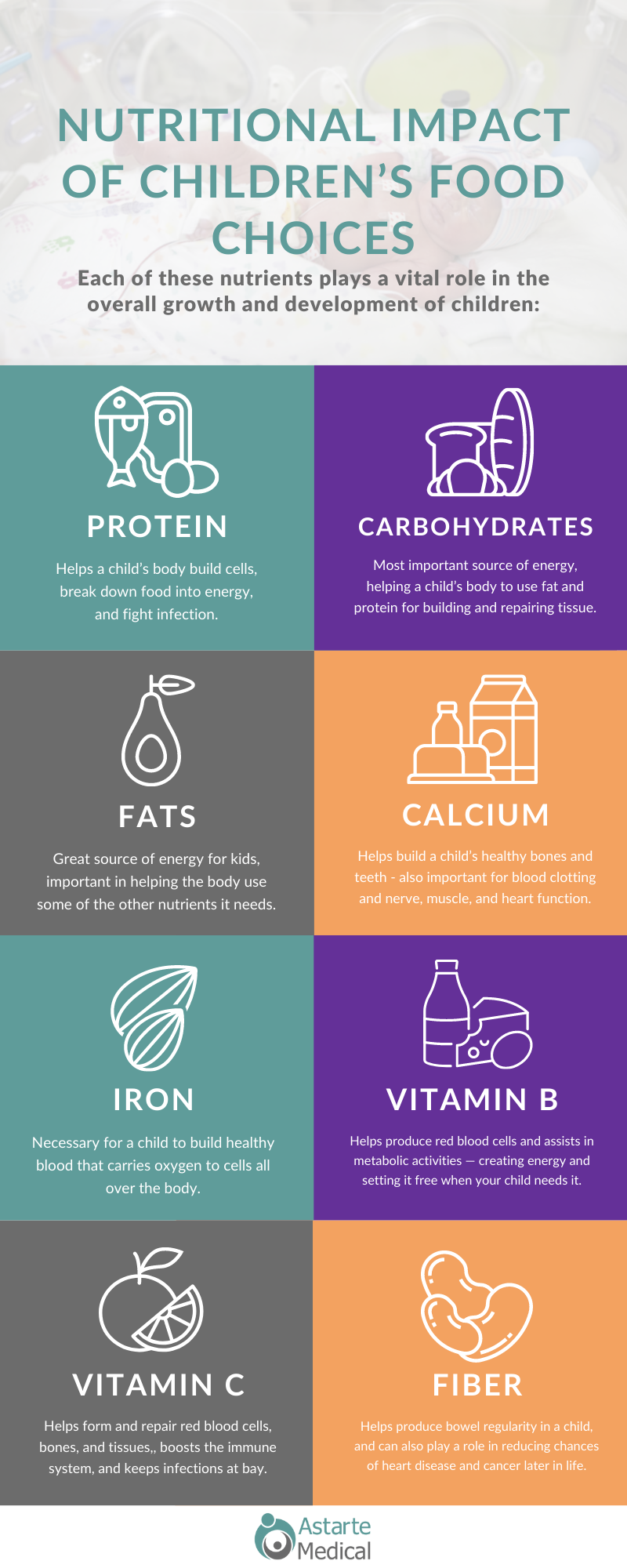By Tammi Jantzen, Co-founder and CFO
The Importance of Nutrition | The First 1000 Days
Nutrition Impacts Growth Outcomes
An apple a day – we all remember our moms telling us “an apple a day keeps the doctor away” to encourage us to eat more fruit. It is well known that eating a well-balanced diet rich in fruits, vegetables, and whole grains provides the proper nutrition to support a healthy lifestyle. But what is “nutrition” and how does it impact us?
Mirriam-Webster defines nutrition as “the process of providing or obtaining the food necessary for health and growth”. The food we eat every day affects how our bodies work, how we heal and grow, and how we maintain energy and strength for years to come.
Food Choices During Pregnancy Directly Impact the Baby
Food necessary for health and growth can take on different forms for different people. For older adults, this means eating foods high in calcium and vitamin D to help maintain proper bone health and eating more fiber-rich foods to help lower the risk for heart disease and type 2 diabetes. For a pregnant woman, supplying her body with a blend of nutritious foods will keep her feeling healthy during pregnancy and could lead to an easier labor. But most importantly, pregnancy is the time in a woman’s life that her eating habits will have a direct impact on another person – that of her growing baby.
Sign-up for our monthly newsletter!
The Nutritional Impact of Children’s Food Choices
You Gotta Nourish To Flourish
For children, adequate nutrition is one of the most important factors influencing growth and immunity. A balanced diet must contain the proper amount of protein, carbohydrate, fat, calcium, vitamins, and fiber. Each of these nutrients plays a vital role in the overall growth and development of children:
- Protein helps a child’s body build cells, break down food into energy, and fight infection.
- Carbohydrates are the body’s most important source of energy, helping a child’s body to use fat and protein for building and repairing tissue.
- Fats are a great source of energy for kids and are easily stored in a child’s body. They are also important in helping the body properly use some of the other nutrients it needs.
- Calcium is essential in helping to build a child’s healthy bones and teeth. It’s also important for blood clotting and for nerve, muscle, and heart function.
- Iron is necessary for a child to build healthy blood that carries oxygen to cells all over the body.
- Vitamin B helps the body produce red blood cells and assists in metabolic activities — this means that B vitamins help make energy and set it free when your child’s body needs it.
- Vitamin C does more than just fight off the common cold. It helps form and repair red blood cells, bones, and tissues. It helps your child’s gums stay healthy and strengthens your child’s blood vessels, minimizing bruising from falls and scrapes. In addition, it helps cuts and wounds heal, boosts the immune system, and keeps infections at bay.
- Fiber helps produce bowel regularity in a child. It can also play a role in reducing the chances of heart disease and cancer later in life.
The First 1000 Days

Nutrition During Pregnancy
Starting with pregnancy, a healthy maternal diet of nutrient-rich foods has a significant impact on a developing child’s metabolism, immune system, physical development, and organ functioning. The roots of obesity and many adult diseases such as heart disease, type 2 diabetes and hypertension begin in pregnancy and are shaped by the nutrition a child receives (or doesn’t receive) in utero. In addition, the human brain develops during pregnancy at an astonishing speed. The neural tube forms just 16 days after conception and by 7 months gestation, a child’s brain takes on a form that resembles that of an adult’s brain. The nutrition that a baby gets from mom through her diet is the indispensable fuel that drives much of this incredible transformation. When a mother lacks adequate calories, protein, fatty acids or key micronutrients in her pregnancy, these vital neurodevelopmental processes can be impaired. A recent study found that pregnant women who keep high-fat, calorie-dense diets while pregnant can pass on a whole slew of health issues to their children such as asthma, diabetes and obesity.
Breastmilk – Nature’s Superfood
Infancy is also a time of remarkable brain development and growth, which is primarily fueled by the nourishment a baby receives. When it comes to nutrition during infancy, breastmilk is the ultimate superfood. In addition to the brain-building benefits it provides, breastmilk gives babies the healthiest start to life. The nutritional and immunological properties unique to breastmilk help protect babies from infection and illness. Breastmilk contains a variety of nutrients, growth factors, and hormones that are vital for a child’s early brain development. Unfortunately, many mothers are unable to meet the American Academy of Pediatrics’ recommendation to exclusively feed breastmilk for 6 months. For many, the decision to breastfeed or formula feed is based on their comfort level, lifestyle, and specific medical situations. For moms who can’t breastfeed or who decide not to, donor milk and infant formula are healthy alternatives. Both can provide babies with the nutrients they need to grow and thrive. However, many parents and caregivers introduce babies to solid foods too early. There is evidence that babies who began to eat solid foods before the age of 6 months are at greater risk for chronic diseases such as obesity, diabetes and celiac disease.
Solid Food Introduction – The Golden Window of Opportunity
When it’s time to introduce infants to solid foods, it is especially important that they have opportunities to learn to like and eat healthy foods. Research shows that the more opportunities children are given to sample unfamiliar foods, the more likely they are to like and accept them. They need to eat nutrient-rich foods, especially those containing vitamin D, iron and zinc, in order to help fuel their growth. Foods that are high in added sugar, salt, and saturated fats should not be part of an infant’s diet. Not only do these kinds of foods contribute to rapid weight gain in infancy, which is a risk factor for obesity later in childhood, but they can also “program” a baby’s taste buds to prefer very sweet, salty or fatty foods. This is a golden window of opportunity to influence a child’s preference for healthy foods. As parents, we want to provide nutritious meals to our children, yet our busy lives can often make it challenging. Sometimes chicken nuggets and fries win out over preparing that nutritious meal we all know is better. As a child grows, they form the ideas and habits that will serve them as an adult. Young children are most likely to develop healthy eating habits when parents model tasting of new and nutritious foods. As they say, you are what you eat – so don’t be fast, cheap, easy, or fake. Parents can use this window of opportunity to be a role model for their children to establish healthy eating habits during childhood and beyond.
Nutrition: It Does A Body Good
Proper nutrition promotes healthy pregnancy outcomes, supports normal growth, development and ageing, helps to maintain a healthy body weight, and reduces the risk of chronic disease leading to overall health and wellbeing. In particular, proper nutrition in the first 1,000 days of life can have a profound impact on a child’s ability to grow, learn and thrive. Optimal nutrition and correction of nutritional deficiencies during those first 1,000 days are of particular significance as beyond two years of age, reversal may become very difficult. Unlike other aspects of life that are completely out of our control, the power is in our hands to provide appropriate nutrition to ourselves and to our children. So drop those fries, make your mom proud, and grab that apple!






